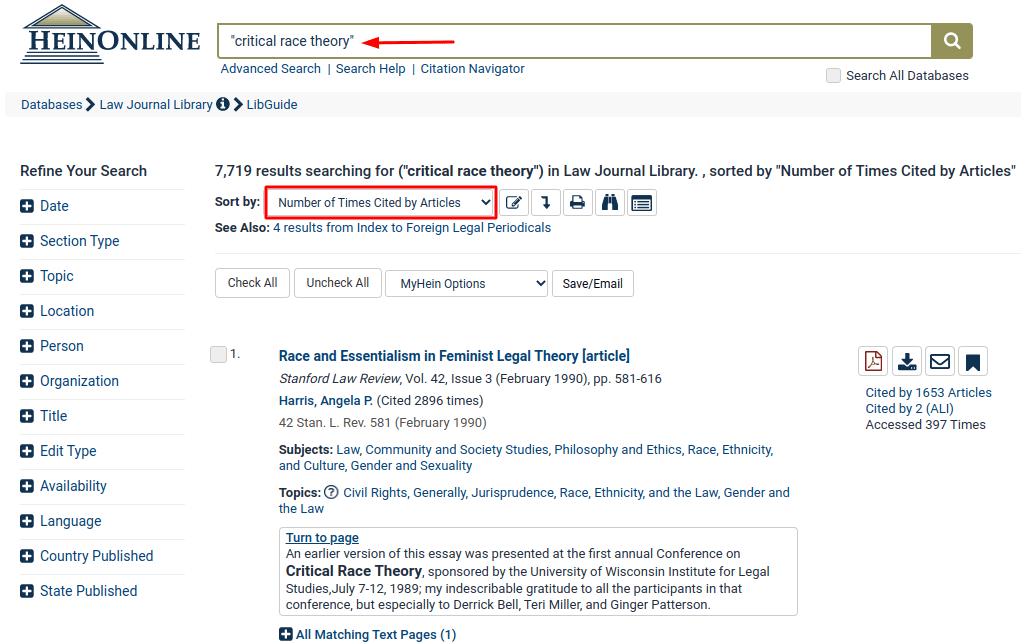Critical race theory is a concept that has been around for decades but became a hot topic of discussion in 2020 after the killings of George Floyd, Breonna Taylor, and other African Americans by police officers. During this time, former President Donald Trump issued an executive order banning federal contractors from conducting racial sensitivity training, reversed earlier this year by President Joe Biden. Trump also claimed during the White House Conference on America History that the The 1619 Project distorts and rewrites American history, which has since sparked the fight over critical race theory being taught in public schools.
What is Critical Race Theory?
Critical race theory (CRT) is an academic movement of civil-rights scholars and activists in the United States who look at how America’s history of racism and discrimination continues to impact the country today. Theorists believe that because of white supremacy, racism exists and continues to maintain its power through law. The movement is rooted in critical theory, which argues that societal problems are influenced and embedded within systems and institutions, rejecting the argument that injustice or racism is not restricted to a “few bad apples.” While CRT initially began as a framework for understanding the relationship between race and American law, it has provided insight into how other marginalized groups are overlooked.
History of Critical Race Theory
Derrick Bell has often been credited as one of the originators of critical race theory. Bell was the first black teacher at Harvard Law School who developed new courses that studied American law through a racial lens. Bell’s departure from Harvard ignited students of color to protest against Harvard’s lack of racial diversity. When the university did not respond to these protests, students Kimberlé Crenshaw and Mari Matsuda organized alternative courses using Bell’s textbook Race, Racism, and American Law.
CRT was not, however, simply a product of a philosophical critique of the dominant frames on racial power. It was also a product of activists’ engagement with the material manifestations of liberal reform.
Although its first formal meeting, titled “New Developments in Critical Rate Theory” began in 1989, organized by Crenshaw, earlier analyses date back to the 1970s when legal scholars, activists, and lawyers took a closer look at why the civil rights era victories had come to a standstill. Following the workshop, scholars began to write more on the topic. Today, more than 20 American law schools offer critical race theory courses, and the premise is being applied to fields of education, political science, women’s studies, ethnic studies, sociology, and more.
Critical Race Theory in HeinOnline
Law Journal Library
To learn more about this movement, let’s run a search for “critical race theory” in the Law Journal Library. With more than 7,500 results, let’s sort the results by number of times cited by articles to see the most authoritative works.

Results include:
- Race and Essentialism in Feminist Legal Theory (cited by 1653 articles)
- Mapping the Margins: Intersectionality, Identity Politics, and Violence against Women of Color (cited by 1282 articles) – This is also the most accessed article in HeinOnline!
- A Critique of “Our Constitution is Color-Blind” (cited by 862 articles)
- Whiteness as Property (cited by 610 articles)
- If He Hollers Let Him Go: Regulating Racist Speech on Campus (cited by 579 articles)
The Law Journal Library also allow users to peruse scholarly works of authors in HeinOnline. Let’s take a look at Derrick Bell’s author profile page. Simply type his name into the one-box search and select the author option from the drop-down menu. Then, select his hyperlinked name within results.

Bell’s author profile contains more than 100 scholarly works, including:
- Racial Reflections: Dialogues in the Direction of Liberation
- Strangers in Academic Paradise: Law Teachers of Color in Still White Schools
- Reconstruction’s Racial Realties
- White Superiority in America: Its Legal Legacy, Its Economic Costs
- Racism is Here to Stay: Now What?
Slavery in America and the World: History, Culture and Law
For the last half-century, scholars interested in slavery and its history have focused on its impact on the modern world. Scholars in many disciplines agree, for example, that the modern industrial economy may in part be a result of the centuries-long system of Atlantic slavery. Today, slavery scholars are found in law schools, business schools, public policy schools, and medical schools. Slavery comes up continuously in political debate over issues of flying the Confederate flag, building monuments, and reparations. The history of slavery in America and the English-speaking world remains monumentally relevant today.
Research slavery with this monumental collection equipped with a Slavery Quick Finder Tool to easily retrieve documents based on their position on slavery, document type, jurisdiction, and topic.
Civil Rights and Social Justice
At this crucial moment in history, HeinOnline offers Civil Rights and Social Justice, a research database created to help users understand the roots of the fight for civil rights, how far our nation has come, and how much we have yet to improve.
Hearings and committee prints, legislative histories on landmark legislation, CRS and GAO reports, briefs from major Supreme Court cases, and publications from the Commission on Civil Rights illuminate the storied (and still-unfinished) struggle for equality in the United States. A varied collection of books on related civil rights topics and a list of prominent civil rights organizations supplement these primary source documents and help take the research beyond HeinOnline.
Learn about the timeline of civil rights in this blog post.
Indigenous Peoples of the Americas: History, Culture & Law
Indigenous people have a rich and storied history which is forever entwined with the evolution of the United States. With nearly 3,800 titles and more than 1.5 million total pages, this library includes an expansive archive of historic materials. Included in the database are hundreds of treaties, treaty-related publications, tribal codes, constitutions, federal case law, government reports, scholarly works, and the entirety of Title 25 (Indians) of the U.S. Code and Code of Federal Regulations.
Learn about the recent landmark decision from the Supreme Court that marked a historic win for Native American tribes in this blog post.
Immigration Law & Policy in the U.S.
Immigration has historically been a polarizing issue, arguably never more so than in today’s political climate. The first comprehensive database of its kind includes a compilation of the most important historical documents and legislation in the United States. Users can view BIA Precedent Decisions, new GAO reports, acts and their legislative histories, law and policy titles, extradition titles, hearings, CRS reports, Supreme Court briefs, scholarly articles, and other related works. It includes more than 200 years of immigration law and policy including notable classics.
Learn about the history of U.S. Immigration Law and Policy in this blog post.
Stay in the Know
Subscribe to the HeinOnline Blog to stay in the know with HeinOnline and to learn about interesting topics like this one. Don’t forget to connect with us on our social media platforms: Facebook, Twitter, Instagram and YouTube!



